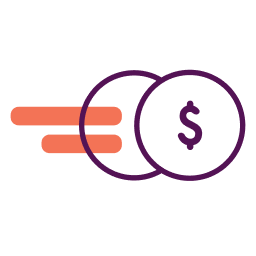Just as an emergency fund is essential when it comes to your personal finances, an emergency fund for your small business can help your business survive setbacks. The average business has about 28 days of cash on hand. And in a Federal Reserve survey of business owners, 17% of business owners said that if faced with two months of declining revenues, they would have to close. A business savings account can be a lifeline. Learn how to create a business savings fund.
Why Small Businesses Need an Emergency Fund
The coronavirus pandemic that hit the US in 2020 made the need for an emergency fund very clear. Many businesses were forced to shut down or shift business operations in a matter of weeks, and those that had cash in the bank were in a much better position to adapt than those that didn’t.
In the 2020 Federal Reserve Small Business Credit Survey (SBCS) published just before the pandemic, 66% of employer firms reported facing financial challenges in the prior 12 months; the most common challenge was paying operating expenses (43%).
While the pandemic forced entrepreneurs to think about building an emergency fund, it’s something that should be part of building a financially healthy business. There are many good reasons to have funds available in your business savings account, including to pay for:
- Unexpected expenses,
- Working capital if sales slow suddenly,,
- Higher than anticipated tax bill,
- Increases in cost of supplies,
- Discounted inventory, equipment or supplies if an opportunity presents itself,
- Increased payroll to staff for a large job,
- Repairs after a physical or natural disaster,
- Unanticipated legal expenses,
- Costs not covered by insurance (in the case of theft, a data breach etc)
Of course this list is virtually endless, and these are just a few of the many reasons why an emergency fund is so important.
Types of Small Business Emergency Funds
A business savings account is an ideal way to save for the unexpected. Some even pay a small amount of interest. The place where you have your business checking account is a great place to start. Just keep in mind that some business savings accounts have minimum balance requirements in order to avoid service fees.
As you build your savings, consider a money-market account or even a Certificate of Deposit. Not only will you earn interest, but the potential penalties for taking money out early may encourage you to avoid tapping those funds.
A business checking account with sub accounts is another option to set aside funds for savings. Checking account sub accounts allow the business owner to dedicate specific amounts toward goals and keep those funds separate from the main checking account.
Back- up options include a line of credit or a business credit card, both of which can be used for short-term cash flow needs.
A line of credit will often offer a larger credit limit but may be harder to qualify for, especially for startups.
A business credit card also offers a line of credit, but interest rates can be high if you carry a balance. A 0% APR credit card may be a good option for lower-cost financing for a year or longer.
Microloans through Community Development Financial Institutions (CDFIs) are another option for business owners who are having difficulty meeting eligibility requirements for bank loans or other traditional financing.
Business insurance can also help you avoid draining your savings account for a covered expense. Whether it’s a burst pipe in your building, an accident on your premises or in a work vehicle, or a data breach that requires significant mitigation expenses, business insurance that covers those scenarios can prove invaluable.
Finally, many business owners rely on their personal funds to help the business cover shortfalls. The 2020 Small Business Credit Survey referenced earlier revealed that almost half (47%) of business owners said they would use personal funds in the event of a loss of business revenues. This is far from ideal. If your business ends up in financial trouble, you may find yourself losing the income from your business as well as money you’ll need to recover personally if you decide to close the business.
How Much Money Should Your Small Business Have in an Emergency Fund?
Most business advisors recommend saving at least 3-6 months of operating expenses in an emergency fund. When you’re first trying to build an emergency fund for your business, though, saving the recommended three to six months of expenses can seem daunting.
Do what you can but be consistent. Make payments into your business savings account just as you would pay employees, taxes or other essential expenses.
As the pandemic illustrated, six months of operating expenses may be the minimum amount you’ll want to save. Saving more than that will provide you greater peace of mind, and will also provide flexibility to take advantage of opportunities to grow your business.
When To Use Your Emergency Fund
Keeping your business savings separate from your business operating expenses can help you avoid tapping them for everyday expenses (rather than true emergencies). When it comes to deciding when to use those funds versus a line of credit or other type of loan, ask yourself whether you’ll be able to pay back financing within less than six months. If you can, then you may want to access credit rather than using your savings. ]
It’s also helpful to think through what will happen if you don’t tap your emergency fund. Could you postpone the expense you are encountering without creating long-term damage to your business, and without falling behind on your business debt payments? Can you get creative to bring in sales more quickly? Are there clients who owe your business outstanding invoices, and is there a way to get them to pay faster? Can you cut expenses temporarily or discontinue non-essential services to save money?
You may want to consult with your accountant, financial advisors or a business mentor to get their advice as well.
How an Emergency Fund Fits Into Your Business Financial Plan
An emergency fund should be an essential part of your business financial plan. If you’ve been running your business as a personal account and just taking money out when it’s available, or if you’ve been operating without a financial cushion, creating the discipline to save will benefit your business in the long run.
While you build your savings account, you may need to rely on credit. Having access to a low-cost line of credit or even a business credit card (perhaps one with a 0% APR) can provide you with short-term financing in case of an emergency.
The key is to line up financing before you encounter a crisis. It may take time to complete the application process, especially if you are looking for funding from traditional financial institutions like banks. (Online lenders typically offer faster approval.) You’ll have more time to shop for the best financing, and your business should be in a better position to qualify for a small business loan or line of credit.
Small Business Emergency Funding Programs
As a result of the COVID-19 pandemic crisis, a number of relief programs were quickly launched to help impacted small business owners, including sole proprietors and independent contractors. Those included the Economic Injury Disaster Loan and EIDL grant program, with grants of up to $10,000 that did not have to be repaid. (This was later expanded to include Targeted Advances which were grant funds available to hardest hit businesses.) These programs were offered to eligible businesses through the US Small Business Administration (SBA.gov).
Congress also allocated funding through the Paycheck Protection Program (PPP) program which offered low interest loans. These loans were eligible for forgiveness if business owners spent their PPP loan funds properly, mainly on payroll.
EIDL and PPP are closed to new applications.
In addition, state and local governments, economic development agencies, private businesses and nonprofit organizations offered covid-19 relief programs in the forms of low-interest loans or small business grants. For example, Accion’s Small Business Relief Fund provided financial assistance to nearly 4000 small business owners.
If your business is still struggling due to the pandemic, consult with your local SBA resource partner (such as your Small Business Development Center or SCORE) to find out what relief programs may still be available in your area. They can also provide free mentoring and consulting to help you grow your business.
This article was originally written on January 31, 2022 and updated on February 4, 2022.



Nav….may be the life saver for my busines thank you.